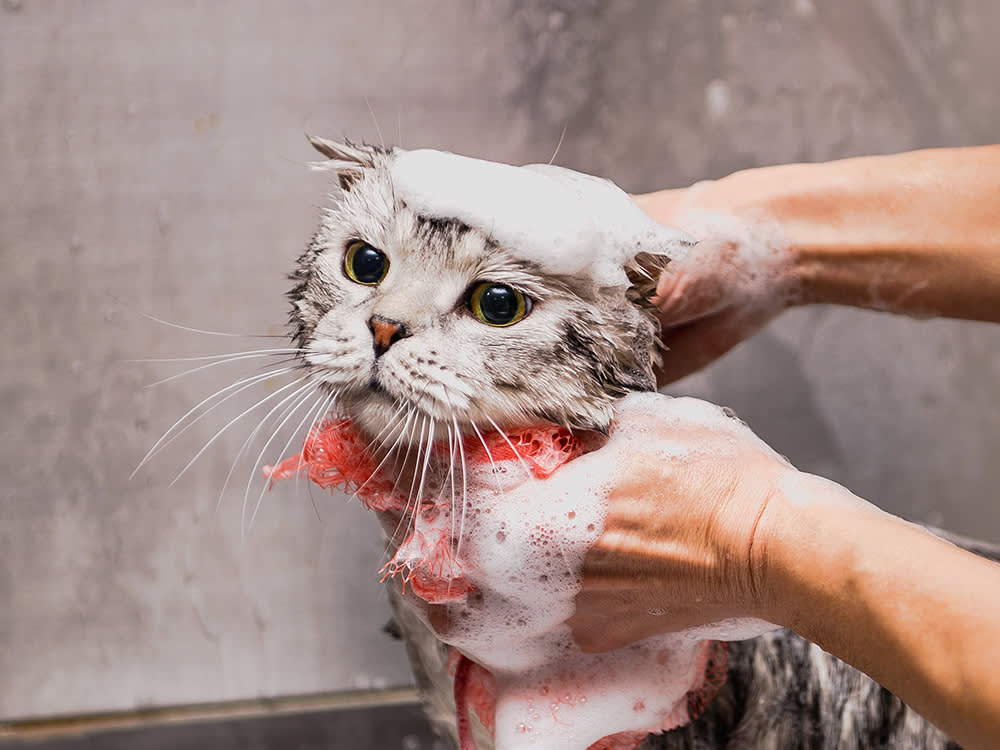Does My Cat Need a Professional Groomer?
If you thought your cat was a self-cleaning evolutionary marvel, you’re not wrong but...

share article
Before I began researching this article, my answer to that question would have been a resounding Hell no. After all, cats are self-cleaning. That’s what all that licking is about. They’re cleaning themselves. Right? RIGHT?
Not so much, according to LA-based cat groomer Jessica Johnson, co-owner of The Pawloropens in a new tab pet salons and chief education officer of West Coast Grooming Academy. “Cats lickopens in a new tab. Groomers groom,” she says. “We actually wash your cat. We get them wet and use soap. We get off all the grease and saliva and litter box dust — all the urine and fecal particles — then we blow dry them and give them a complete brush-out. We trim their nailsopens in a new tab and clean their earsopens in a new tab. Sometimes we even brush their teethopens in a new tab, if your cat can tolerate it. We clean out their eye boogers — which is especially important for Persians. We also remove mats from their fur, which aren’t just unsightly; they can actually be really painful and cause major health problems.”
Proper cat grooming can also benefit cat owners. “My boyfriend is allergic to cats and we have three,” adds Johnson. ”When you wash a catopens in a new tab on a regular basis, you are removing all the dander and saliva from their coats. Once you do that, there’s really nothing left to be allergic to.”
So how often should you wash your cat?
“Mine are on a monthly grooming schedule to help manage my boyfriend’s allergies and we haven’t had any issues since,” says Johnson. Otherwise, it really just depends on the cat. For long-haired cats, Jessica recommends professional grooming every four to six weeks, but for medium and shorthair cats, grooming every two to three months is often sufficient, especially if they’re not sheddingopens in a new tab too much.
Finding the right groomer, however, can be tough. “There is such a huge demand for cat groomers right now that a lot of people get into the business without any sort of specialized training,” says Johnson. “I’m a certified feline master groomer. I’ve been through extensive training, so I know how to handle cats safely. A lot of that has to do with properly managing the cat’s stress. Cats can lash out when they are overstressed — claws and teeth and all that bad stuff.
Cats are also really sensitive and sometimes have undiagnosed medical issues that can make grooming dangerous, especially in the case of heart issues. If a cat gets too stressed out, they can actually have a heart attack during the groom, so it is essential that your groomer knows what signs of stress to look out for and when to end the groom, give the cat a rest, or, if necessary, administer first aid or CPR.
How do you find yourself such a groomer?
Johnson recommends checking the groomer directory of the National Cat Groomer’s Instituteopens in a new tab, where she received her own training. Barring that, she recommends asking the following questions before selecting a groomer:
What kind of cat-specific training or certifications do they have?
Are they pet first aid and CPR-trained?
What is their process when grooming a cat?
Do they groom cats in the same room as dogs?
Are there certain hours that are dog-free?
“That last one’s really important to me,” says Johnson. “At The Pawloropens in a new tab, we always try to schedule cats on a specific day and block off a time when there will be no dogs in the building. It’s about risk management and creating a safe, calming atmosphere for the cats. If you walk into a salon and it is loud and chaotic with dogs barking and a bunch of driers going, I would consider moving on. Every salon is going to have noise, but if you walk in and feel overwhelmed or the noise is hurting your ears, just know that it is going to be much worse for your cat.”
How should you prepare your cat for a grooming service?
Johnson recommends getting your cat to the groomer as early in their development as possible, not just when they are old and medical issues mean they can no longer “groom” themselves. “A cats’ socializationopens in a new tab period ends right around seven or eight weeks, which, if you’re adopting a kitten, is usually right around the age you are getting them. After that, they can become nervous and fearful, so it is important to get them to the groomer as soon as possible so they learn early on that grooming is just a normal part of life and nothing to be afraid of.“
And if you’re adopting an older catopens in a new tab or you’ve had your cat for a while already, well, there’s no time like the present! As someone who recently groomed his 14-and-a-half-year-old cats for the first time, let me tell you: You will not regret it. My boys have never been this soft, fluffy, and gorgeous. And having finally done it, I can’t imagine ever going back.

Charles Manning
Charles Manning is an actor, writer, and fashion/media consultant living in New York City with his two cats, Pumpkin and Bear. Follow him on Instagram @charlesemanningopens in a new tab.